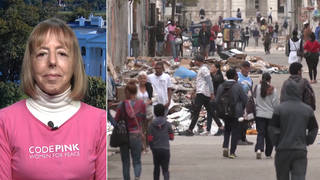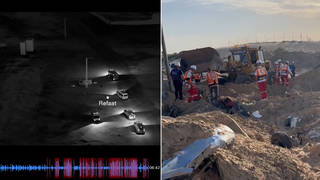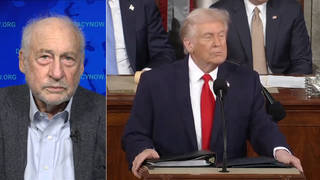
Topics
Guests
- Maria Luisa Mendonçadirector of the Network for Social Justice and Human Rights in Brazil.
Brazil’s Supreme Court has sentenced former President Jair Bolsonaro to more than 27 years in prison for plotting a military coup and seeking to “annihilate” democracy in Brazil following his election defeat in 2022. The sentencing marks the first time a former Brazilian head of state is brought to trial and convicted for attempting to overthrow the government. Bolsonaro and his co-conspirators, who were also sentenced to prison, hatched a plan that involved using armed forces to assassinate the President-elect Luiz Inácio Lula da Silva and Supreme Court Justice Alexandre de Moraes.
The decision was made amid political pressure from the Trump administration to drop the case against Bolsonaro. Secretary of State Marco Rubio pledged that the U.S. would “respond accordingly,” calling the ruling a witch hunt. “Latin American countries need to be united and have a very strong position to defend democracy and to defend our sovereignty and independence,” says Maria Luísa Mendonça, director of the Network for Social Justice and Human Rights in Brazil.
Transcript
AMY GOODMAN: This is Democracy Now!, democracynow.org. I’m Amy Goodman.
We turn now to Brazil, where a panel of Supreme Court justices has sentenced former President Jair Bolsonaro to more than 27 years in prison for plotting a military coup and seeking to “annihilate” democracy in Brazil following Bolsonaro’s election defeat in 2022. A panel of five Brazilian court justices handed down the sentence just hours after reaching the historic verdict, which marks the first time a former head of state in Brazil is brought to trial and convicted of attempting to overthrow the government.
Bolsonaro and his co-conspirators, who were also sentenced to prison, hatched a plan that would involve using armed forces personnel to assassinate the President-elect Luiz Inácio Lula da Silva and Supreme Court Justice Alexandre de Moraes. The court also detailed attempts by Bolsonaro to cast doubt on Brazil’s electoral system, leading to the January 8th riots back in 2023, when thousands of Bolsonaro’s supporters attacked government buildings.
This is the Brazilian Supreme Court Justice Cármen Lúcia explaining the verdict.
JUSTICE CÁRMEN LÚCIA: [translated] The prosecutor’s office provided conclusive evidence that a group led by Jair Messias Bolsonaro, comprised of key figures from the government, the armed forces and the intelligence services, implemented a progressive and systematic plan to attack democratic institutions, with the aim of harming the legitimate transfer of power in the 2022 elections.
AMY GOODMAN: That’s Brazilian Supreme Court Justice Cármen Lúcia.
We now turn to Supreme Court Justice Alexandre de Moraes, who Bolsonaro planned to assassinate. He said, while announcing the sentence, that Bolsonaro had attempted to, quote, “annihilate the essential pillars of the democratic rule-of-law state … the greatest consequence … would have been the return of dictatorship to Brazil,” Moraes said.
Bolsonaro has been under house arrest in Brasília since August and will not be required to report to prison until he’s exhausted all appeals to his conviction.
Bolsonaro is a staunch ally of President Trump, who described the case against Bolsonaro as a “witch hunt,” imposing 50% tariffs on Brazil and sanctioning the Brazilian Supreme Court Justice Alexandre de Moraes in retaliation. Trump said he’s “very unhappy” with the verdict and called Bolsonaro an “outstanding man.” Meanwhile, Secretary of State Marco Rubio threatened the United States would, quote, “respond accordingly to this witch hunt.”
Back in Brazil, opponents of Bolsonaro took to the streets in Brasília, Rio de Janeiro and other major cities, celebrating the historic verdict.
For more, we’re joined here in New York by Maria Luísa Mendonça, director of the Network for Social Justice and Human Rights in Brazil, visiting scholar at City University of New York Graduate Center.
Welcome back to Democracy Now! The significance of this verdict and the sentence of more than 20 years for Bolsonaro?
MARIA LUÍSA MENDONÇA: Yes, that’s a very important moment. It’s a historic moment in Brazil. As you know, Amy, Brazil had over 20 years of a military dictatorship, and the return to democracy was only about 40 years ago, so it’s a very young democracy. So, that’s why it’s so important that the Supreme Court in Brazil didn’t leave this crime in impunity. So, it’s very important to set this record and the precedent in Brazil, so we defend our democracy and we defend our democratic institutions, because the attempted coup was not only against the elections when President Lula was elected, but against all democratic institutions in the country, including the Supreme Court.
AMY GOODMAN: Talk about exactly what happened back in 2023.
MARIA LUÍSA MENDONÇA: Well, there was a whole — what the Supreme Court showed with the proofs and the evidence was that there was a plot that took over a year. So, they described, step by step, all the ways in which the Bolsonaro and his allies plot this attempted coup, that culminated in a mob attacking institutions in Brasília, the building of the Congress and the building of the Supreme Court, and destroying property. So, at the same time, there was this plot to assassinate President Lula and his vice president, Geraldo Alckmin, and Alexandre de Moraes, the Supreme Court justice. So, it was a very broad — what they described, what the Supreme Court described, was a criminal organization that took several steps to remain in power.
AMY GOODMAN: And the significance of the pressure the United States is trying to put on Brazil, the 50% tariffs? Who knows what they’ll do now? And it looks like very much the identification President Trump has with Bolsonaro. There, it was January 8th, attempted coup; in the United States, it was January 6th. I wanted to go to Trump talking to reporters. He was asked about the Bolsonaro conviction.
PRESIDENT DONALD TRUMP: Well, I watched that trial. I know him pretty well, a foreign leader. He was a good — I thought he was a good president of Brazil. And it’s very surprising that that could happen. That’s very much like they tried to do with me, but they didn’t get away with it, at all. But I can only say this: I knew him as president of Brazil. He was a good man.
AMY GOODMAN: So, that’s Donald Trump. But his opinion is his opinion. But what the U.S. policy is now in putting pressure on Brazil, what that means?
MARIA LUÍSA MENDONÇA: Yes, the U.S. claimed that the 50% tariffs on Brazil was because of a trade imbalance, but, actually, the U.S. has a trade surplus with Brazil. So it’s definitely a political pressure against the judiciary in Brazil. So, the Supreme Court didn’t take that. So, at the same time, the Brazilian government took measures to — so the economy in Brazil would not suffer very much from the tariffs. So, I think the response from the Brazilian government and from the Supreme Court was to say that Brazil is an independent country and is not a colony anymore. So, the exact words that they use is not — is that Brazil is not a banana republic. So, they stood up, and that was a very important point.
AMY GOODMAN: I wanted to go to Brazil’s President Luiz Inácio Lula da Silva speaking during a televised address last weekend, before the verdict and the sentence.
PRESIDENT LUIZ INÁCIO LULA DA SILVA: [translated] We will resist any attempt to undermine it. The role of some Brazilian politicians who encourage attacks on Brazil is unacceptable. They were elected to serve the Brazilian people, but they only defend their own interests. They are traitors to the nation. History will not forgive them.
AMY GOODMAN: So, that’s Lula.
MARIA LUÍSA MENDONÇA: Yes, I think it was very important that the Brazilian government took measures to protect the Brazilian economy and to protect the rule of law, and at the same time that the justices during the trial mentioned that they would not be intimidated, that a tweet from a foreign government would not change the course of a trial in Brazil, where they had vast evidence of the crimes that Bolsonaro is facing now.
AMY GOODMAN: As director of the Network for Social Justice, what does this verdict mean for activists, for Indigenous communities, for marginalized groups, who were particularly targeted and threatened during Bolsonaro’s presidency?
MARIA LUÍSA MENDONÇA: Yeah, that’s very important, because Bolsonaro dismantled several important institutions, environmental institutions, human rights institutions. So, that is reaffirming that Brazil is not going to accept going back to a system of oppression and dictatorship. So, social movements in Brazil are celebrating, and everyone who defends human rights should be celebrating, as well.
AMY GOODMAN: And finally, the message to the world around the issue of democracies grappling with the rise of far-right leaders who refuse to accept electoral defeats?
MARIA LUÍSA MENDONÇA: Exactly. I remember, Amy, in 2016, we had this conversation during the parliamentary coup against President Dilma. And at that time, the Supreme Court actually went along with the coup against Dilma, but Bolsonaro —
AMY GOODMAN: You’re talking about former Brazilian president, who was impeached, Dilma Rousseff.
MARIA LUÍSA MENDONÇA: Exactly. So, and — but Bolsonaro was so extreme, his policies were so extreme, that the Supreme Court, the mainstream media also felt that he went too far. So, even those institutions now understand that it’s very important to defend democracy. And so, I think that with all the events that took place since the attempted parliamentary coup in Brazil and when Dilma Rousseff, former president, was impeached, now we feel that there is a conciliation with that history, the recent history, as well as with the two-decade-old military dictatorship that we had in Brazil that imposed so much violence in the country.
AMY GOODMAN: Finally, are you concerned about the U.S.'s actions right now towards Venezuela's — towards Venezuela under the guise of the “war on drugs,” the blowing up of the ship, the positioning of U.S. military warships? Do you think that could extend to Brazil?
MARIA LUÍSA MENDONÇA: Well, I think that Latin America needs to be united. Latin American countries need to be united and have a very strong position to defend democracy and to defend our sovereignty and independence, so — and I think that it’s very important also to build solidarity with human rights organizations in the U.S. and people who defend democracy here in the U.S. and in Latin America.
AMY GOODMAN: Maria Luísa Mendonça, we thank you so much for being with us, director of the Network for Social Justice and Human Rights in Brazil, visiting scholar here in New York at City University of New York Graduate Center.
Coming up, we go to Nepal, where 51 people have been killed in youth-led anti-corruption protests. Back in 20 seconds.
[break]
AMY GOODMAN: “Shock” by the Chilean musician Ana Tijoux, performing in our Democracy Now! studio.












Media Options